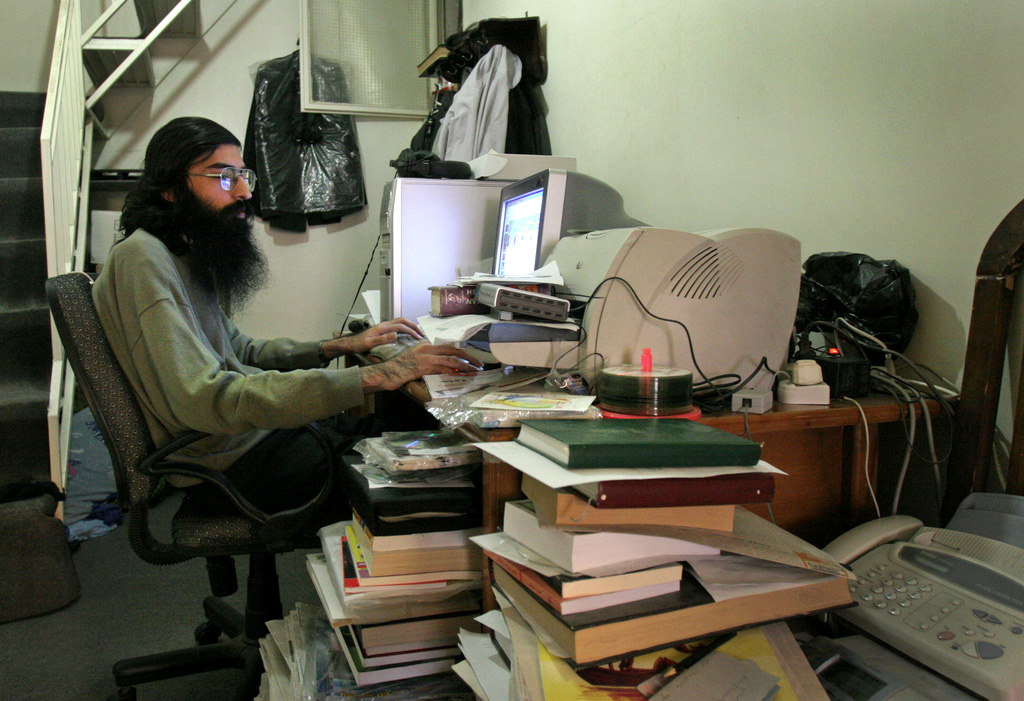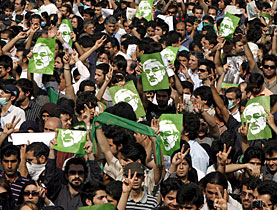“Dialogue is better than one-sided judgements”

Hundreds of people are on death row in Iran, says Amnesty International. Sakineh Mohammadi-Ashtiani, sentenced to stoning for her husband’s murder, has made global news.
As part of the human rights dialogue between Switzerland and Iran, the treatment of young people by the Iranian legal system was the subject of a workshop in Tehran this week.
Switzerland has been engaged in a human rights dialogue with Iran since 2003, but it is not clear – at least to outsiders – whether it has been fruitful.
Christa Markwalder, who chairs the Foreign Affairs Committee of the House of Representatives, told swissinfo.ch that the committee keeps the human rights dialogue with Iran under what she described as “critical observation”.
An independent group of experts is currently evaluating the impact of this dialogue and is due to report at the end of the year.
The committee has agreed to wait to hear its conclusions before deciding whether it should recommend to the government that the dialogue should continue.
Passing on values
Committee member Luzi Stamm, of the rightwing Swiss People’s Party, is generally in favour of talking to Iran.
“Staying in a dialogue is positive,” he told swissinfo.ch. “Someone must remain in contact with difficult countries.”
“I think that is a fairly strongly held attitude in Switzerland.”
Fellow committee member Carlo Sommaruga, of the centre-left Social Democratic Party, pointed out to swissinfo.ch that by definition Switzerland is only going to hold a dialogue on human rights with countries that violate them.
“I think it is wise to keep open a channel by which we can pass on our values of defending human rights.”
But he believes that there are circumstances in which a dialogue should be scrapped.
“The question we must ask is whether our attempt at dialogue is of any use, if it is making any progress, or is it being used by the authorities for their own ends, whether domestically or internationally.”
However, he added that he had no evidence that this was in fact the case at the moment.
Stamm agreed that this is a danger, but one to be lived with.
“If you have contacts with problematic governments, they can always say: ‘We have excellent relations with Switzerland’, but I still think Switzerland has to play this role.”
Secrecy
The secrecy with which the human rights dialogue is surrounded – and not only in the case of Iran – worries Amnesty International, as Christine Heller, deputy country coordinator for Iran, explained.
“Switzerland needs to be careful that this isn’t used as a pretext for doing nothing. Someone should have to account for what’s happening, for example by reporting to parliament.
“They should say what has been achieved: there should be goals for the dialogue… This isn’t done.”
While she accepts that some things have to be done behind the scenes, she is calling for greater publicity about the issue.
And the fact that Switzerland conducts a special human rights dialogue with Iran must not be used as an excuse not to bring up the issue at every official meeting, or at trade talks, she says.
Sommaruga admits that despite the fact that the dialogue has been going on for several years, no results have been achieved that have been made public.
But he says he does not have any way to know whether there has been an impact behind the scenes.
“We know that power in Iran is not monolithic: there are different groups, and we need to see if this [dialogue] has helped some of them to use these arguments to push the debate forward.”
The Swiss foreign ministry says the dialogue gives Switzerland the chance to raise violations of human rights on a regular basis.
“In human rights policy it’s always difficult to measure success,” ministry spokesman Pierre-Alain Eltschinger told swissinfo.ch in a written interview.
“It can certainly be seen as a small success that the foreign ministry can hold regular discussions with the Iranian authorities about violations of human rights and can condemn them.”
“And in particularly delicate cases dialogue is always better than one-sided judgements.”
Special role
Stamm accepts that not everyone likes what Switzerland is doing.
“If, as a neutral country, you remain in dialogue with everyone, criticism will not be slow in coming. Even so, I think Switzerland should play this role.”
He points out that Switzerland is able to represent US interests in Iran precisely because it has kept channels open to the Iranians.
The US has not had an embassy in Tehran since the overthrow of the shah in 1979.
Eltschinger says that it is not a matter of Swiss neutrality, but the implementation of the country’s consistent human rights policy.
He is not worried about criticism.
“Swiss human rights policy is recognised, precisely because it is applied consistently.”
Switzerland has conducted a human rights dialogue with Iran since October 2003.
The Iranian partners are officials from the ministries of justice and foreign affairs.
The dialogue focuses on the death penalty, corporal punishment, torture, freedom of expression, the rights of minorities and of women.
So far there have been four official rounds of dialogue.
In 2004 Swiss experts were able to visit a number of prisons in Iran.
On September 12-13 a meeting of experts in Tehran compared and discussed the criminal law relating to young offenders in the two countries.
Swiss Foreign Minister Micheline Calmy-Rey has said that she always raises human rights issues when she meets Iranian leaders.
There are tight restrictions on freedom of expression, association and assembly.
Civil society activists are liable to be arrested and prosecuted, often in unfair trials.
They are often banned from travelling abroad, and their meetings may be disrupted.
Torture and other ill-treatment of detainees are common, and goes unpunished.
Many detainees are denied medical attention.
Sentences include flogging and amputation.
At least 346 people are known to have been executed in 2009, but the number was probably higher.
Two men were executed by stoning.
Among those executed were eight juvenile offenders.
At least 133 faced execution for crimes committed while they were minors.
Source: Amnesty International Iran Country Report 2009
Sakineh Mohammadi Ashtiani is an Iranian Azeri woman who has been convicted of murder and adultery.
She has been on death row in Iran since 2006.
Her controversial case became internationally known in 2010 after high profile reports that she was convicted for the crime of adultery and sentenced to execution by stoning.
Following these reports, the Iranian embassy in London denied Ashtiani will be stoned to death.
An international campaign started by her children has sought aid in overturning her sentence and brought attention to her case.
On September 8, 2010, an Iranian foreign ministry official confirmed that the sentence of stoning against her was suspended, though she still faced death by hanging or a prison term for charges pending against her.
Source: Wikipedia

In compliance with the JTI standards
More: SWI swissinfo.ch certified by the Journalism Trust Initiative












You can find an overview of ongoing debates with our journalists here . Please join us!
If you want to start a conversation about a topic raised in this article or want to report factual errors, email us at english@swissinfo.ch.